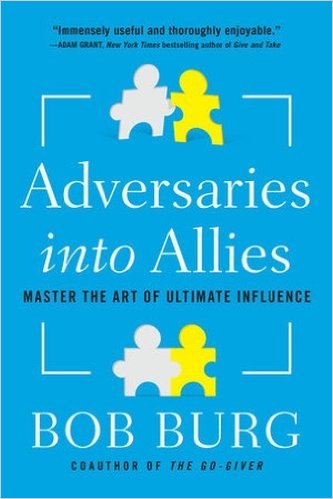
Book Summary – Adversaries Into Allies

Adversaries into Allies:
Win People Over Without Manipulation or Coercion
By
Bob Burg
There are not many that would disagree with Burg’s basic premise:
- Unless you are able to influence the way others think and act you will be limited in your success.
Burg introduces the reader to a number of simple rules and techniques that – if used – will help turn “adversaries into allies”. The suggestions that he makes are easy to understand, stand on their own, and can be quickly “tested” for effectiveness. A great companion book is Dale Carnegie’s How To Win Friends and Influence People as many of Burg’s principles mirror those of Carnegie.
The book is broken into seven sections and reads quickly and easily. While the highlights of the book are shown below, this book definitely warrants taking the time to read versus just reviewing the points as Burg DEMONSTRATES the techniques via his writing / you actually learn what he is suggesting as you read the book. The sections of the book and the key lessons are as follows:
Section One: The Five Principles of Ultimate Influence – Understanding the Basics of All Human Action and Interaction
- There are five basic principles
- Control Your Own Emotions (Section Two)
- Understand The Clash of Belief Systems (Section Three)
- Acknowledge Their Ego (Section Four)
- Set the Proper Frame (Section Five)
- Communicate With Tact and Empathy (Section Six)
- It’s not enough to be nice. Nice is good. But there are other skills you need
- Persuasion is based on influencing for the good of others. Manipulation is based on influencing for the good of yourself. Persuasion is based on positive emotions. Manipulation is based on negative emotions. Persuade don’t manipulate.
Section Two: Control Your Own Emotions – This Comes Before Everything Else in the Process, Every Time
- You need to RESPOND versus REACT (great exercise, spend the next day seeing how you do!)
- Verbal attacks will happen. Be ready for them and RESPOND instead of REACTING
- Always be calm
- Do not let anger influence your behavior
- Don’t become emotionally attached to the outcome
- Think before you speak
- Realize that sometimes you won’t agree with the other person. That’s OK!
- Realize that not all “facts” are accurate. Sometimes folks have an agenda
Section Three: Understanding the Clash of Belief Systems – Avoiding Those Deadly Misunderstandings
- Realize that we all have ingrained belief systems and they influence our ways of thinking and our actions
- Seek first to understand the other’s belief system
- Accept that you are responsible for what they hear. If they are not getting your point, it’s because you did not figure out how to frame it in terms that their belief system will “accept” it
- Constantly be aware (i) of your belief system and (ii) that you likely don’t have all of the information on the situation at hand
- Realize that the person you are interacting with may be dealing with issues that have nothing to do with you / “it’s not personal”
- People often operate under the golden rule (do unto others as you would have them do unto you) versus the platinum rule (do unto others as THEY would have you do unto them). Sometimes they REALLY think they are being nice when you perceive it as annoying!
- You need to understand the underlying cause of the other person’s concern
- Don’t respond until you understand the issue / understand what is going on
- Remember that sometimes people perceive the IDENTICAL situation differently
- Get rid of / eliminate your personal belief systems that are hindering your ability to persuade others
Section Four: Acknowledge Their Ego – Working Effectively Within The Ultimate Human Motivator
- Never embarrass someone. It serves no purpose
- Be an impartial judge versus a jealous attorney
- Look for the common ground versus the areas of disagreement
- Sometimes people have been made to feel unimportant. Make them feel important!
- Handwritten notes never go out of style
- Per Dale Carnegie – Give the other person a fine reputation to live up to
- Recognize if your common operating method is to look for disagreements. If so, change this!
- Sincere compliments never go out of style
- Recognizing someone doing something RIGHT is rarely done, but greatly appreciated
- Saying “thank you” or “I appreciate you” is done too infrequently. Do both more!
Section Five: Set the Proper Frame – Do This Correctly and You Are 80 Percent of the Way to the Win/Win Outcome You Desire
- The situation will always be framed – be it by you or your counterparty. Make sure it is by you!
- Setting positive expectations is critical
- Smiles are universally effective
- Focus on them / ask questions about them / make it about them
- Do not be afraid to show your weakness – it shows you are human
- Find your common ground quickly and prior to getting in to discussions on areas of disagreement (Dale Carnegie principle of “getting them to say yes” at work here!)
- It’s not about you, it’s about them
- Ask “What can I do to help you?”
- Do your best to explain THEIR position, THEIR perspective in your words – let them know that they have been heard and understood
- If they want to do/act/think in a certain way AND it is aligned with an acceptable solution, don’t argue with them – it’s about getting to the solution, not “being right”
- Set the other person at ease as quickly as possible / avoid any negative framing
- Don’t allow the other person to use “either/or” to force your decisions. You are likely being manipulated if you experience this technique
- Ask questions in a way that assumes the answer you want and then make it easy for the other person to see the benefit TO THEM of ending up at that end state
- Adopt the habit of always seeing the positive side of the situation. Over time this will have a major impact on how you view others AND how others view you
Section Six: Communicate With Tact and Empathy – The Big Difference That Makes the Big Difference
- Tact is the “language of strength”. Speak only in this language / always be tactful in your interactions with others
- Practice empathy (empathy = recognizing what they feel, sympathy = recognizing what you feel)
- Use “lead in phrases” (e.g. “I’m wondering”, “you know more about”, “I might be wrong”, etc.)
- Acknowledge them and acknowledge the points they make
- Speak kindly of your competitors
- Tact is NOT compromise
- Let them know they have a “back door” are free to walk away. In so doing you show that you are confident in what you are offering/suggesting
- Say no, but do it graciously
- Never sacrifice your principles. Gracefully acknowledge your discomfort and move on
- Always leave the door open when turning down an alternative
- Be patient with those that interrupt. It’s a common fault and many times they are aware of it / will eventually listen if you are patient with them
- Allow them to do you a favor / put yourself in their debt
- Avoid “hard” words such as “the fact is”, “certainly”, “always”, etc.
- Make sure (i) the time is right and (ii) there is enough time for the dialogue. Timing IS everything
- Reintroduce yourself to folks – we all forget names and you’ll make it easy for them
- Be particularly tactful when collecting money. Sometimes they forgot. Sometimes they are embarrassed. In either case, make it easy for them
- Use the expression “My Pleasure” versus “No Problem” – VERY POWERFUL!
- Always remember WIIFM (what’s in it for me)
- Apologize quickly and sincerely
- Sometimes people just want you to pay attention to/acknowledge them – little things are huge
- Two ears, one mouth. Spend more time listening
- Find your common ground/shared experiences ASAP. We are “pack animals” and like to know that the person we are interacting with is from our tribe
- Pre-apologize – “I’m sorry to bother you with this, you must be very busy, I was hoping…”
Section Seven: The Character of Ultimate Influencers – Even More Important Than What You Say and What You Do Is Who You Are
- Have principles and don’t back down from them. EVER!
- Always speak fondly of other people (Dale Carnegie – Give the other person a fine reputation to live up to)
- Focus on your strengths, BUT don’t totally ignore your weaknesses
- Acknowledge the problem, but live in the solution
- Have the confidence to surround yourself with the best possible team
- Be consistent and predictable. Let people know they can count on you. Model this behavior in all aspects of your life
- Learn from your mistakes
- Replay your interactions with others in your mind. Ask yourself how you could have done better
If you would like to download a PDF copy of this book summary you can do so by clicking here
At F5 Financial Planning we focus on helping individuals and families find balance between faith, friends and family, fitness and finance. We make sure that they have the financial freedom to enjoy those things in life that are important to them. And while we believe the left-brain facts and data are critical; we work with our clients to get them in the right state of mind to focus on the goals they want to achieve.
Some other posts that you might like:


